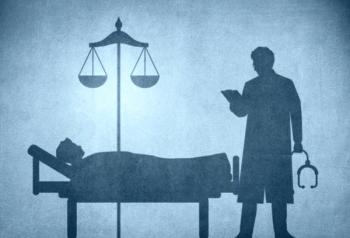
“I’m Not Sick!”: Ethical Dilemmas With Treatment Over Objection
How can you provide the best care when presented with ethical and legal issues?
CASE CLOSEUP
Consultation-liaison psychiatrists and trainees are often consulted to assess capacity in medically admitted patients who have a history of psychiatric illness. Subsequent decisions about providing medical and psychiatric treatment over objection (TOO) may involve hospital ethics committees and legal counsel.
We present a case in which the issue of TOO for an incapacitated patient remained incompletely resolved due to a conflict between the most ethically appropriate treatment and the most legally appropriate treatment. This conflict, along with uncertainty about the
Case Summary
“Mr Reese,” a 38-year-old man, presented to the emergency deparment (ED) brought in by ambulance, which he reportedly activated himself due to cough. He was tenuously domiciled and had no family or social supports. Most of his history was obtained from the chart. He had a history of schizoaffective disorder, bipolar type, had been psychiatrically hospitalized many times, and had attempted
After a basic workup in the ED, Mr Reese was admitted to medicine for community acquired pneumonia. He was found by both the ED and medicine teams to be psychotic, intermittently refusing various interventions including blood draws and IV antibiotics. Psychiatry was consulted to manage the patient’s
In the context of incapacity and no surrogate, questions remained about how to proceed if Mr Reese continued to refuse medical treatment (eg, antibiotics), psychiatric treatment (eg, haloperidol decanoate and oral olanzapine), or any additional studies required for medical clearance prior to acceptance by a psychiatric unit (eg, EKG, blood draws). Which, if any, should he receive over his objection? Which, if any, could he legally receive, and under what circumstances? He was medically stable at the time, but there was concern he could crash given his severely immunocompromised status. He had not been violent, but he was paranoid, hostile, labile, and his high viral load was of particular concern to any staff who might attempt a blood draw.
Legal and Ethical Considerations for TOO
In New York State, different sections of law govern TOO on medical units and psychiatric units (see Figure). In either case, in an emergency (inconsistently defined as serious harm to life or limb to patient or others), it is generally permissible—if not ethically obligatory—to provide medical and psychiatric interventions regardless of a patient’s ability to consent or object. Outside of an emergency, providing medical or psychiatric TOO to a patient lacking capacity and without a surrogate, requires a court order. The main difference between medical and psychiatric units is that court hearings are held on a weekly basis on the psychiatric unit, but to arrange a court hearing for a patient on a medical unit is an opaque process that could take much longer, or the court may not be willing to hear it.
Separate from the legal questions are the ethical ones. In New York State, medical hospitals are mandated to establish ethics committees to assist with disagreements regarding capacity and/or treatment decisions. Two basic principles in the ethical framework for TOO are: (1) the need to balance patient’s autonomy with beneficence and nonmaleficence, and (2) lacking capacity does not in itself negate a patient’s right to autonomy. Other considerations include the likely severity of harm without a proposed intervention, the efficacy of the proposed intervention, and the logistics of treating over objection.1
Case Outcome
In the case of Mr Reese, there was daily back-and-forth between medicine and psychiatry teams regarding Mr Reese’s capacity and if/when to treat over his objection. Psychiatry recommended ethics consultation. Three separate ethics consultations ultimately concluded that the time differential between a TOO court hearing for the same patient on a medical unit versus a psychiatric unit represented an administrative delay. Thus to allow Mr Reese to remain acutely psychotic, because of an administrative delay in permitting TOO for treatment of his psychiatric disorder, would be grossly wrong and harmful to the patient and possibly to staff, if he were to become violent.
In this case, the most ethical course proposed by the ethics committee would have been to treat the patient with psychotropics over his objection, even without a court order permitting it.
The issue became a moot point, as Mr Reese began reliably accepting oral antibiotics, oral olanzapine, and one-time haloperidol decanoate, though he did not accept EKGs or blood draws. Legal counsel did not become involved. Mr Reese was quickly cleared by the medicine team; however, he remained on the medical unit for more than 2 weeks awaiting transfer to a psychiatric unit. With psychiatric treatment from the consultation-liaison team and acceptance of psychotropics, he gradually became more organized, less labile, and less delusional. He no longer met criteria for involuntary psychiatric admission and was discharged from the medical unit to supportive housing.
Discussion
In New York State, the court serves as an objective third party to ensure patient autonomy is considered in cases of TOO on both medical and psychiatric units. In this case, the legal route to treatment (with administrative delay) was deemed ethically inappropriate, but the ethically recommended route would have been legally inappropriate. This conflict would be resolved if access to court hearings for incapacitated medically admitted patients were increased.Increased court access would also minimize the delay for these patients in receiving beneficial care, assuming TOO is granted.
In retrospect, much of the back and forth between the medicine and psychiatry teams was due not only to distress about finding an ethical and legal course of action, but also about who has the necessary information to answer these questions, and then who should decide. Although psychiatry is necessarily involved in many capacity assessments, psychiatry is not the authority about whether or how to proceed with TOO for a patient who lacks both capacity and a surrogate.
This delineation of responsibilities is not always clear to providers, particularly to trainees. Even though hospital policies and procedures are in place, they are not always known to trainees who rotate through different hospitals and services. Providers’ lack of knowledge about legal and ethical perspectives and roles regarding TOO can lead to delayed or suboptimal patient care, exposure of hospitals and providers to liability, and exacerbation of provider distress. Given their role in capacity assessments, consultation-liaison services can play an important role in educating primary teams about how and when to involve ethics or legal counsel, or in helping hospitals develop relevant protocols.2 With increased collaboration among psychiatry, ethics, and legal counsel, the best care can be provided to all patients.
Dr Cody is a PGY3 resident at Columbia University.
Do you have a case to discuss? Share it with us at
References
1. Rubin J, Prager KM.
2. Kornfeld DS, Muskin PR, Tahil FA.
Newsletter
Receive trusted psychiatric news, expert analysis, and clinical insights — subscribe today to support your practice and your patients.







